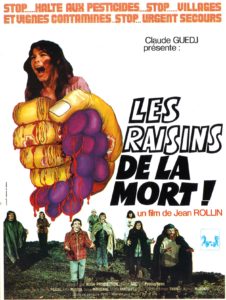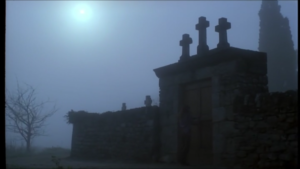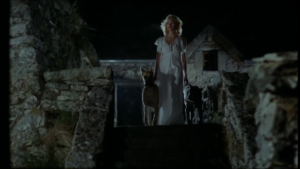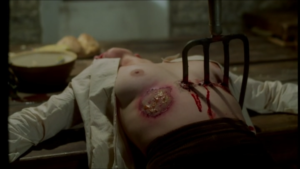Grapes of Death / Les Raisins de la Mort (1978)

We caught this absurdly-titled zombie(ish) film by Jean Rollin in its last days of streamability on Amazon Prime, which is purging its service of everything good and pure (e.g. trashy French vampire movies) at the end of June. It’s not in my top 5 Jean movies, but I enjoyed it.
Some workers return through dead-looking grape fields coughing through their gas masks. Their villainously scarved-and-piped tractormaster assures them that new better gas masks are coming, and encourages them to relax.
Meanwhile alone on a train, a young brunette and her blonde friend are heading on holiday. A strange man boards the otherwise empty train, and sits by the brunette while her friend is away in the bathroom. He has a rapidly growing lesion on his face which soon becomes so gruesome that she runs away, and he chases her. She finds her friend dead in the bathroom, pulls the emergency brake and runs from the train. He seems disappointed, like his “murder her friend and chase her” pick-up strategy has failed one too many times.

What passes for a safe haven, in a Jean movie.
She seeks refuge first in a mausoleum or something (locked), then in a creepy farmhouse. The creepy farmhouse inhabitants, a father (lesion on hand) and daughter, let her stay, but insist that their phone and car both don’t work. When our purple-bloused heroine goes upstairs, she finds a woman’s body, and the daughter tells her that her father has gone insane. They hatch an escape plan but the father murders the daughter after revealing that she too has the disease, then pursues the heroine as she gets in the car. He begs her to run him over and she does.
From then on she runs into more zombies and survivors (though this is a blurrier line than usual) and more grim episodes play out. The most mysterious person she encounters is a beautiful blonde woman who has no marks anywhere on her body (she proves it) but is still in league with the zombies.

For me, the infected villagers were a lot scarier than normal zombies because they could still talk, reason, and have human reactions to things, all while becoming disfigured and compelled to kill. Oh. They’re more like real people losing their minds / acting under a compulsion, which is more frightening than the old animated-corpse cannon-fodder approach.
There’s a bit of hamfisted political dialogue shoved in (aka the best dialogue in the movie), after our heroine meets some uninfected guys with a shotgun and dynamite, who will pass for “the good guys.” The older of the men fought the Nazis in the French Resistance, and the young man briefly chews him out, suggesting that what’s important isn’t fighting the Germans, but fighting fascism, whether it’s German or French, and berating him for feeling comfortable living between a nuclear plant and a weapons plant (not pictured.) There’s definitely a thing going on where the zombie-ism represents people succumbing to a fascistic ideology–maybe a militaristic, corporatist sort of culture bleeding in from America (or wine). But probably not a very deep thing. But still, there’s something evocative about how the movie shows people caught up in–whatever–and turning violent and horrifying while remaining people, compared to how zombies are usually our cultural shorthand for “people that aren’t people anymore, it’s okay to shoot them.” (Our virtuous younger man also gives the older one shit about basically thinking this way about the zombies, and enjoying gunning them down too much.) (this is cool and probably accurate, but I had given up on the movie and started playing guitar at this point.) (Hey man, whatever fails to float your boat.)

My main complaint about the movie is that the female characters keep their clothes on too much. That might sound like a puerile complaint, but Jean can be kind of a puerile guy, and often really satisfies that part of us. Sex and nudity usually happen in Jean’s movies for no forced reason, just for their own beautiful sake, and at the drop of a hat. And I think that’s a healthy and joyful thing, compared to a lot of your grosser American horror movies where sex is something very bad, maybe even something that we want to see punished. This movie comes a lot closer to that, in that two of the female characters keep their clothes on until during/after their killing, bringing one of those situations where it feels like the violence is what we’re expected to get off on–not my cup of tea. In other words, the women in this movie are insufficiently sexualized, and I find that problematic.
